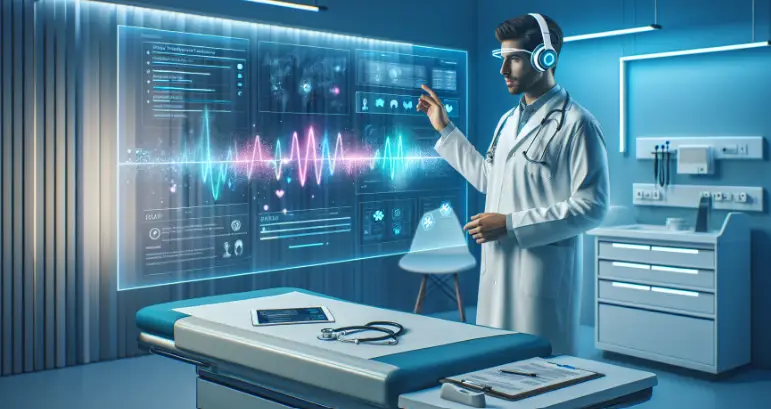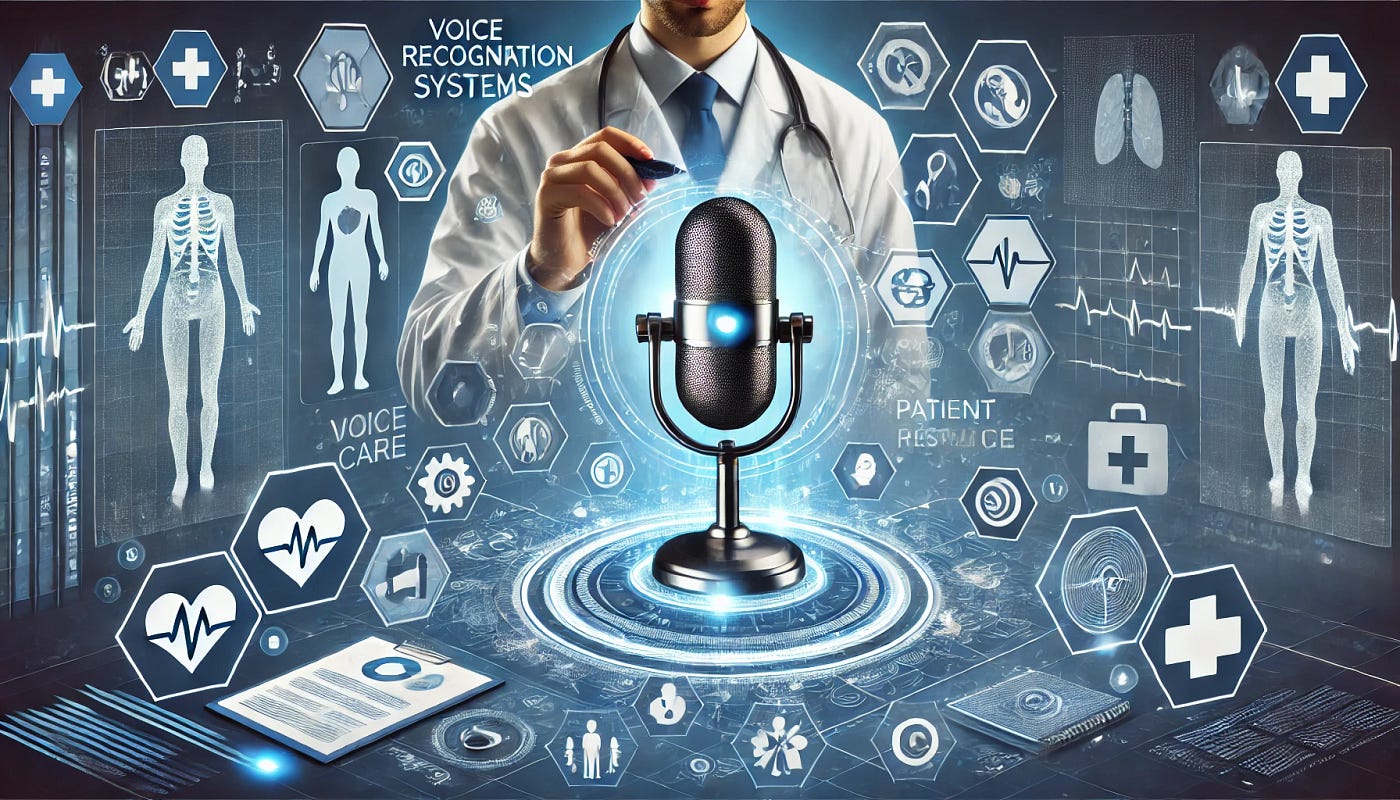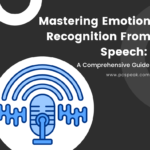Speech recognition technology has been making waves in the healthcare industry, and it’s not hard to see why. With this advanced technology, healthcare professionals are now able to accurately and quickly transcribe their patients’ medical records through voice dictation. But what exactly is speech recognition technology and how is it transforming the way we approach healthcare? If you’re curious about the impact of this innovative tool on the industry, you’ve come to the right place.
In this article, we’ll delve into the world of speech recognition technology in healthcare and explore its benefits as well as some potential challenges. We’ll discover how this cutting-edge tool is making healthcare more efficient and improving patient outcomes. So whether you’re a healthcare professional looking to incorporate speech recognition into your practice or simply interested in learning more about its role in modern medicine, keep reading! Let’s dive into a fascinating discussion on speech recognition technology in healthcare.
So, speech recognition technology in healthcare?
Speech recognition technology has revolutionized the healthcare industry, providing numerous benefits and also posing some challenges. This technology allows for spoken words to be automatically transcribed into text, eliminating the need for manual transcription. This saves time and reduces errors, improving overall efficiency in healthcare settings.
One of the main benefits of speech recognition technology in healthcare is its speed and accuracy. With this technology, medical professionals can quickly dictate patient notes or reports without having to pause to type them out manually. This not only saves time but also ensures that important information is accurately recorded.
Moreover, speech recognition technology helps improve patient care by allowing doctors to focus more on their patients rather than being tied down by paperwork. It also enables easier access to patient records as they are stored digitally and can be easily searched through using keywords.
However, there are some challenges associated with this technology as well. One major challenge is ensuring privacy and security of sensitive patient information when using voice commands or dictating notes. There have been concerns about potential data breaches or unauthorized access to patient records through these systems.
Another challenge is the learning curve for medical professionals who may not be familiar with using such technology. It takes time and practice to become efficient at dictation and understanding how the system works.
Despite these challenges, it is clear that speech recognition technology has had a significant impact on healthcare. Its ability to save time, improve accuracy, and enhance patient care makes it an invaluable tool in modern medicine. As advancements continue to be made in this field, we can expect even greater improvements in efficiency and quality of care within the healthcare industry.
Exploring the Benefits of Speech Recognition Technology in Healthcare
Speech recognition technology has become a game-changer in the healthcare industry. Imagine walking into a doctor’s office, and instead of scribbling notes or typing away at a keyboard, the physician simply speaks their thoughts aloud. This innovation allows for rapid documentation of patient information, making it easier to keep accurate records. Efficiency is one of its greatest advantages; doctors can spend more time with patients rather than drowning in paperwork. Furthermore, this technology can help eliminate errors caused by manual entry, leading to better patient care and enhanced safety.
Beyond efficiency and accuracy, speech recognition tools offer accessibility benefits that can’t be overlooked. For individuals who may struggle with traditional input methods due to physical limitations or disabilities, voice-activated systems provide an empowering alternative. The ease of use encourages broader adoption among medical professionals as well as patients who prefer speaking over writing. Additionally, these systems often come equipped with advanced features like customizable vocabulary specific to various medical fields.
Some key benefits include:
- Faster Documentation: Speeds up record-keeping.
- Improved Patient Interaction: Enhances communication during consultations.
- Error Reduction: Minimizes mistakes in data entry.
In summary, speech recognition not only streamlines processes but also fosters inclusivity within healthcare settings.

Uncovering the Challenges and Limitations with Speech Recognition Tech in Medical Practice
Speech recognition technology has made significant strides in recent years, especially within the medical field. However, healthcare professionals still face various challenges when integrating this innovative tool into their daily routines. One major hurdle is achieving high accuracy in diverse environments where background noise can disrupt clarity. For instance, a bustling hospital ward filled with chatter and equipment beeping can hinder the software’s ability to understand spoken words correctly. Furthermore, accents and dialects can complicate matters; not all systems are trained equally well to recognize every voice or pronunciation variant.
Another limitation lies in the intricate medical terminology that practitioners commonly use. Unlike everyday language, specialized vocabulary often includes complex terms that speech recognition systems may struggle to interpret accurately. This can lead to miscommunication or incorrect documentation of patient records which could potentially harm patient care. While many platforms offer customization options for specific vocabularies, these processes typically require manual input from users—a time-consuming task that detracts from valuable clinical hours.
Ultimately, while speech recognition holds promise for streamlining workflow and improving efficiency in medicine, it necessitates further refinement to address these existing challenges effectively before becoming a staple in every healthcare setting.
Read also: dragon naturally speaking 13 download
How Speech Recognition Technology is Improving Patient Outcomes: Actual Case Studies
Speech recognition technology is transforming the healthcare landscape in remarkable ways. Imagine a busy doctor who has just seen multiple patients, each with unique needs and histories. Instead of spending hours typing notes into a computer, they can simply speak their observations and recommendations aloud. This not only saves time but also enhances accuracy in patient records. For instance, at a renowned hospital, doctors have reported that using speech recognition software has cut down documentation time by over 30%. As a result, physicians can focus more on patient care rather than getting lost in paperwork.
Moreover, real-world case studies highlight how this technology directly contributes to improved patient outcomes. In one instance, a hospital implemented an advanced speech recognition system that captured clinical details accurately during consultations. This led to fewer medication errors since prescriptions were transcribed correctly every time—a common issue when relying solely on handwritten notes or manual entries. Additionally, studies show that when clinicians use voice-to-text tools, their ability to engage with patients increases significantly; they spend less time looking at screens and more eye contact with those under their care. Overall, the shift toward utilizing this innovative technology not only streamlines workflows but also fosters deeper connections between healthcare providers and patients.
The Future of Speech Recognition Technology in Healthcare
Speech recognition technology is transforming the healthcare landscape, offering a glimpse into a future where communication between medical professionals and patients evolves significantly. Imagine doctors being able to dictate notes seamlessly during consultations, allowing them to focus more on patient care rather than typing on a keyboard. This technology leverages advanced algorithms and machine learning to understand specialized vocabulary, enabling it to capture complex medical terms with remarkable accuracy. As software improves, real-time transcription becomes possible, giving healthcare providers immediate access to crucial information without any delays.
Moreover, this innovation has immense potential for enhancing patient engagement and accessibility. For instance, individuals with disabilities or those who struggle with traditional forms of communication can benefit from voice-assisted systems that allow them to express their needs comfortably. These tools can even translate spoken language into different languages in real time, breaking down barriers in diverse communities. Furthermore, as speech recognition integrates more deeply with electronic health records (EHR), clinicians will be able to retrieve data effortlessly through simple voice commands—resulting in improved efficiency across the board.
In this way, the future of speech recognition technology promises not only streamlined workflows but also enriched interactions within the healthcare system.



